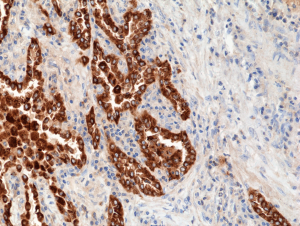anti-Surfactant protein B (human) Rabbit Monoclonal (RM370)
| Code | Size | Price |
|---|
| REV-31-1256-00-R100 | 100 ul | £455.00 |
Quantity:
Prices exclude any Taxes / VAT
Overview
Antibody Isotype: Rabbit IgG
Antibody Clonality: Recombinant Antibody
Antibody Clone: RM370
Regulatory Status: RUO
Target Species: Human
Applications:
- Immunohistochemistry (IHC)
- Western Blot (WB)
Shipping:
Blue Ice
Storage:
+4°C
Images
Documents
Further Information
Alternate Names/Synonyms:
SP-B; Pulmonary Surfactant-Associated Protein B
Concentration:
N/A
EClass:
32160000
Form (Short):
liquid
Formulation:
Liquid. 50% Glycerol/PBS with 1% BSA and 0.09% sodium azide.
Handling Advice:
Avoid freeze/thaw cycles.
Immunogen:
A peptide corresponding to residues near C-terminus of human SP-B (Surfactant protein B).
Long Description:
Recombinant Antibody. This antibody reacts to human SP-B (Surfactant protein B) and proSP-B. Applications: WB, IHC. Source: Rabbit. Liquid. 50% Glycerol/PBS with 1% BSA and 0.09% sodium azide. Pulmonary surfactant is a complex mixture of phospholipids and proteins that is secreted from type II cells in alveoli and reduces the surface tension at the alveolar air-liquid interface, providing alveolar stability necessary for normal ventilation. Four distinct proteins isolated from pulmonary surfactant are termed surfactant proteins A, B, C, and D. SP-A (28-36kDa) and SP-D (43kDa) are collagenous carbohydrate-binding proteins, whereas SP-B (8-9kDa) and SP-C (4kDa) are non-collagenous hydrophobic proteins. SP-B is expressed in pulmonary adenocarcinomas with acinar, papillary, bronchioloalveolar, and solid growth patterns. Squamous cell and large cell carcinomas of the lung and nonpulmonary adenocarcinomas do not express SP-B. ProSP-B is glycosylated in the Golgi apparatus and undergoes carboxy- and amino-terminal proteolysis by a cathepsin D-like protease.
NCBI, Uniprot Number:
P07988
Package Type:
Vial
Product Description:
Pulmonary surfactant is a complex mixture of phospholipids and proteins that is secreted from type II cells in alveoli and reduces the surface tension at the alveolar air-liquid interface, providing alveolar stability necessary for normal ventilation. Four distinct proteins isolated from pulmonary surfactant are termed surfactant proteins A, B, C, and D. SP-A (28-36kDa) and SP-D (43kDa) are collagenous carbohydrate-binding proteins, whereas SP-B (8-9kDa) and SP-C (4kDa) are non-collagenous hydrophobic proteins. SP-B is expressed in pulmonary adenocarcinomas with acinar, papillary, bronchioloalveolar, and solid growth patterns. Squamous cell and large cell carcinomas of the lung and nonpulmonary adenocarcinomas do not express SP-B. ProSP-B is glycosylated in the Golgi apparatus and undergoes carboxy- and amino-terminal proteolysis by a cathepsin D-like protease.
Purity:
Protein A purified.
Source / Host:
Rabbit
Specificity:
This antibody reacts to human SP-B (Surfactant protein B) and proSP-B.
Transportation:
Non-hazardous
UNSPSC Category:
Primary Antibodies
UNSPSC Number:
12352203
Use & Stability:
Stable for at least 1 year after receipt when stored at -20°C.



